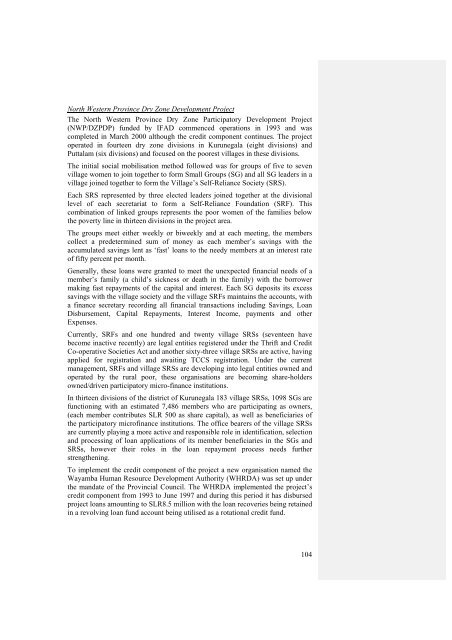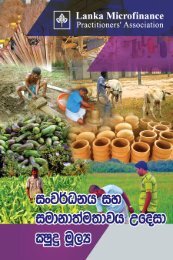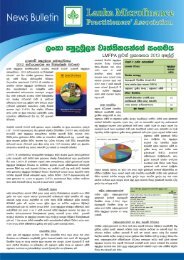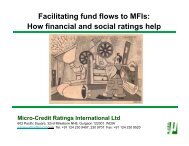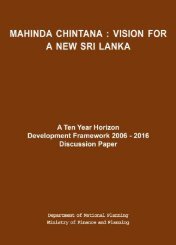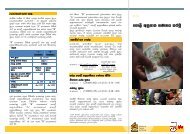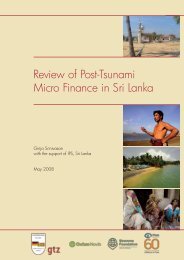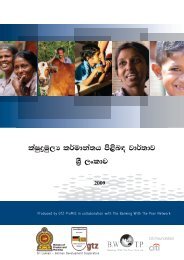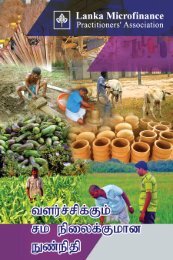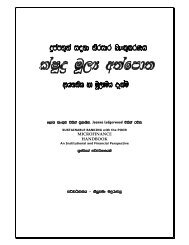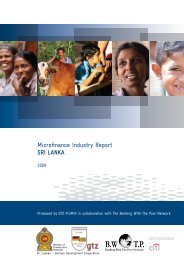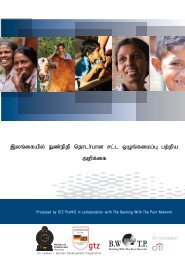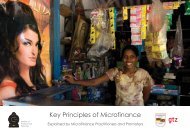National Microfinance Study of Sri Lanka: Survey of Practices and ...
National Microfinance Study of Sri Lanka: Survey of Practices and ...
National Microfinance Study of Sri Lanka: Survey of Practices and ...
You also want an ePaper? Increase the reach of your titles
YUMPU automatically turns print PDFs into web optimized ePapers that Google loves.
North Western Province Dry Zone Development Project<br />
The North Western Province Dry Zone Participatory Development Project<br />
(NWP/DZPDP) funded by IFAD commenced operations in 1993 <strong>and</strong> was<br />
completed in March 2000 although the credit component continues. The project<br />
operated in fourteen dry zone divisions in Kurunegala (eight divisions) <strong>and</strong><br />
Puttalam (six divisions) <strong>and</strong> focused on the poorest villages in these divisions.<br />
The initial social mobilisation method followed was for groups <strong>of</strong> five to seven<br />
village women to join together to form Small Groups (SG) <strong>and</strong> all SG leaders in a<br />
village joined together to form the Village’s Self-Reliance Society (SRS).<br />
Each SRS represented by three elected leaders joined together at the divisional<br />
level <strong>of</strong> each secretariat to form a Self-Reliance Foundation (SRF). This<br />
combination <strong>of</strong> linked groups represents the poor women <strong>of</strong> the families below<br />
the poverty line in thirteen divisions in the project area.<br />
The groups meet either weekly or biweekly <strong>and</strong> at each meeting, the members<br />
collect a predetermined sum <strong>of</strong> money as each member’s savings with the<br />
accumulated savings lent as ‘fast’ loans to the needy members at an interest rate<br />
<strong>of</strong> fifty percent per month.<br />
Generally, these loans were granted to meet the unexpected financial needs <strong>of</strong> a<br />
member’s family (a child’s sickness or death in the family) with the borrower<br />
making fast repayments <strong>of</strong> the capital <strong>and</strong> interest. Each SG deposits its excess<br />
savings with the village society <strong>and</strong> the village SRFs maintains the accounts, with<br />
a finance secretary recording all financial transactions including Savings, Loan<br />
Disbursement, Capital Repayments, Interest Income, payments <strong>and</strong> other<br />
Expenses.<br />
Currently, SRFs <strong>and</strong> one hundred <strong>and</strong> twenty village SRSs (seventeen have<br />
become inactive recently) are legal entities registered under the Thrift <strong>and</strong> Credit<br />
Co-operative Societies Act <strong>and</strong> another sixty-three village SRSs are active, having<br />
applied for registration <strong>and</strong> awaiting TCCS registration. Under the current<br />
management, SRFs <strong>and</strong> village SRSs are developing into legal entities owned <strong>and</strong><br />
operated by the rural poor, these organisations are becoming share-holders<br />
owned/driven participatory micro-finance institutions.<br />
In thirteen divisions <strong>of</strong> the district <strong>of</strong> Kurunegala 183 village SRSs, 1098 SGs are<br />
functioning with an estimated 7,486 members who are participating as owners,<br />
(each member contributes SLR 500 as share capital), as well as beneficiaries <strong>of</strong><br />
the participatory micr<strong>of</strong>inance institutions. The <strong>of</strong>fice bearers <strong>of</strong> the village SRSs<br />
are currently playing a more active <strong>and</strong> responsible role in identification, selection<br />
<strong>and</strong> processing <strong>of</strong> loan applications <strong>of</strong> its member beneficiaries in the SGs <strong>and</strong><br />
SRSs, however their roles in the loan repayment process needs further<br />
strengthening.<br />
To implement the credit component <strong>of</strong> the project a new organisation named the<br />
Wayamba Human Resource Development Authority (WHRDA) was set up under<br />
the m<strong>and</strong>ate <strong>of</strong> the Provincial Council. The WHRDA implemented the project’s<br />
credit component from 1993 to June 1997 <strong>and</strong> during this period it has disbursed<br />
project loans amounting to SLR8.5 million with the loan recoveries being retained<br />
in a revolving loan fund account being utilised as a rotational credit fund.<br />
104


